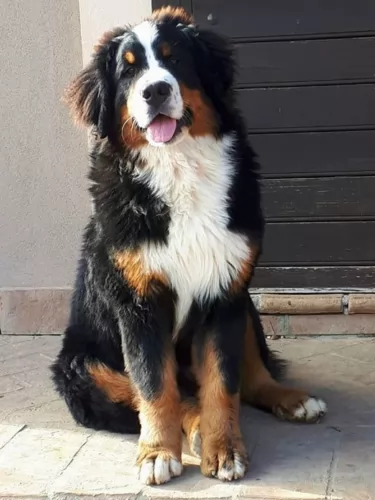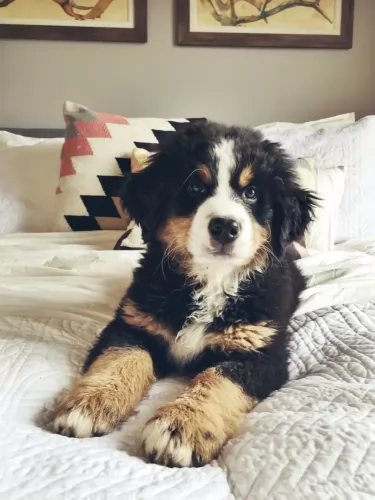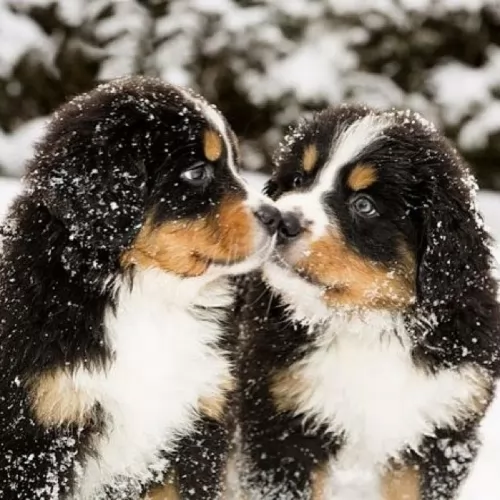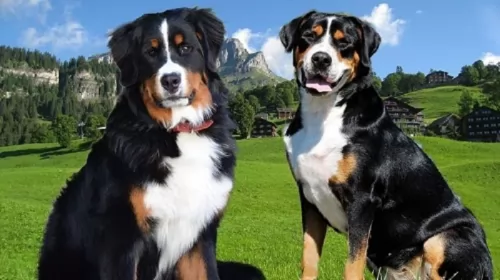 Petzlover
Petzlover Mountain Burmese is originated from Myanmar but Shiloh Shepherd is originated from United States. Mountain Burmese may grow 41 cm / 17 inches higher than Shiloh Shepherd. Both Mountain Burmese and Shiloh Shepherd are having almost same weight. Mountain Burmese may live 6 years less than Shiloh Shepherd. Mountain Burmese may have less litter size than Shiloh Shepherd. Mountain Burmese requires Low Maintenance. But Shiloh Shepherd requires High Maintenance
Mountain Burmese is originated from Myanmar but Shiloh Shepherd is originated from United States. Mountain Burmese may grow 41 cm / 17 inches higher than Shiloh Shepherd. Both Mountain Burmese and Shiloh Shepherd are having almost same weight. Mountain Burmese may live 6 years less than Shiloh Shepherd. Mountain Burmese may have less litter size than Shiloh Shepherd. Mountain Burmese requires Low Maintenance. But Shiloh Shepherd requires High Maintenance
 The Burmese Mountain Dog is quite often taken to be the Bernese Mountain Dog, a Swiss farm dog. However, the Burmese Mountain Dog comes not from Switzerland but from Myanmar and Burma. The Burmese was bred to hunt skunks and guard livestock for the northern tribesman of Myanmar. The way they hunted for the aggravating skunks was to hide themselves in the underbrush and wait for the skunk to go by. Their facial markings confuse skunks when they see him in the bush with a black and white face. At the same time, his rust color lets the hunter know he is the dog not the skunk.
The Burmese Mountain Dog is quite often taken to be the Bernese Mountain Dog, a Swiss farm dog. However, the Burmese Mountain Dog comes not from Switzerland but from Myanmar and Burma. The Burmese was bred to hunt skunks and guard livestock for the northern tribesman of Myanmar. The way they hunted for the aggravating skunks was to hide themselves in the underbrush and wait for the skunk to go by. Their facial markings confuse skunks when they see him in the bush with a black and white face. At the same time, his rust color lets the hunter know he is the dog not the skunk.
The Mountain Burmese is an incredible athlete despite the size. They are agile. They are quick. They can climb trees – as many as fifty feet while chasing a skunk. They also make a great companion and love to be a family dog. They are calm and gentle as an adult and great with kids. They are easily trained but remember they can climb trees. However, they do not do well with cats that are black and white or solid black because they confuse them with the skunk prey.
 The Shiloh Shepherd is currently a hybrid that breeders are attempting to develop into a new breed. New York breeder, Tina Barber, out of Shiloh Shepherds kennel developed dogs when in 1974, she attempted to develop a German Shepherd line. She wanted a GSD that was more like the ones she remembered from her childhood.
The Shiloh Shepherd is currently a hybrid that breeders are attempting to develop into a new breed. New York breeder, Tina Barber, out of Shiloh Shepherds kennel developed dogs when in 1974, she attempted to develop a German Shepherd line. She wanted a GSD that was more like the ones she remembered from her childhood.
Tina took her foundation stock out of the AKC and got the FIC (Federation of International Canines) to recognize the Shiloh Shepherd as a separate breed. The FIC is not the same as the FCI or Federation Cynoloquque Internationale. In 1991 the Shiloh Shepherd Dog Club of America was formed, and the shepherd was recognized by the American Rare Breed Association.
Official recordkeeping on the breed began in 1993. The computer system TCCP maintains breed records and the Shiloh Shepherd has at least 9 generations in the system. Tina Barber was president of the Shiloh Shepherd Dog Club of America and oversaw the international club as well. She was responsible for the breed. After her death in 2011, her daughter took her place in working with the breed.
The Shiloh and the German Shepherd were then crossed to develop the King Shepherd.
 The Mountain Burmese Dog is a large, sturdy, well built and athletic canine. Strong and well balanced, he is agile and athletic when it comes to the work, he has to do in chasing skunks. He has a full body with a large head and dark, oval eyes. The Burmese has triangular ears close to his head and medium in size. With a flat, broad skull the muzzle is straight and strong. They have black noses and a scissors bite, on their muscular, strong neck. With a deep chest and broad back, they have strong ribs. Finally, the tail is bushy, long and hangs low.
The Mountain Burmese Dog is a large, sturdy, well built and athletic canine. Strong and well balanced, he is agile and athletic when it comes to the work, he has to do in chasing skunks. He has a full body with a large head and dark, oval eyes. The Burmese has triangular ears close to his head and medium in size. With a flat, broad skull the muzzle is straight and strong. They have black noses and a scissors bite, on their muscular, strong neck. With a deep chest and broad back, they have strong ribs. Finally, the tail is bushy, long and hangs low.
 Shiloh Shepherds are giant dogs, much larger than the usual German Shepherd Dog. The Shiloh had been bred to be a companion animal and not a guardian or herder. The Shiloh looks more like a wolf than either the German or the King Shepherd Dog. Their back is straighter than the GSD and they are larger, more stable and more intelligent. They were bred to show a complimentary balance between strength and elegance.
Shiloh Shepherds are giant dogs, much larger than the usual German Shepherd Dog. The Shiloh had been bred to be a companion animal and not a guardian or herder. The Shiloh looks more like a wolf than either the German or the King Shepherd Dog. Their back is straighter than the GSD and they are larger, more stable and more intelligent. They were bred to show a complimentary balance between strength and elegance.
They have slightly domed, broad heads with a muzzle that gradually tapers, strong cheekbones and black lips. Their ears are triangles, well cupped and firm. The Shiloh Shepherds eyes are either brown or very dark. They have a straight back which is muscular and broad. Their chests deep and their tails plush, long and curved.
They have a very “heavy” appearance compared with other shepherds. They are well muscled in both the lower and upper thighs. Their coat is plush, and they have a dense undercoat. Their hair is harsh to the touch. There is both a smooth coat and a plush coat with the plush coat being more prevalent.
 The kind of health issues that most large or giant dogs have to deal with are some of the same things that this breed dealt with.
The kind of health issues that most large or giant dogs have to deal with are some of the same things that this breed dealt with.
 The Shiloh Shepherd has some health issues to deal with. These include: They seem to have very sensitive stomachs and intestinal issues.
The Shiloh Shepherd has some health issues to deal with. These include: They seem to have very sensitive stomachs and intestinal issues.
• Bloat – gastric dilatca ation volvulus – twisted stomach or intestines. Needs immediate veterinary care.
• Small intestine bacterial overgrowth – diarrhea, difficulty absorbing nutrients, abdominal pain.
 Feed a high quality dog food designed for large or giant puppies. Feed 3times a day 2.5 times for puppies and go easy on the treats
Feed a high quality dog food designed for large or giant puppies. Feed 3times a day 2.5 times for puppies and go easy on the treats
There is a definite tendency for these dogs to become obese. Don’t overfeed. Don’t free feed. Large breed high quality dog food should be fed 2 times a day and go easy on the treats. Watch his weight.
strength, stamina
The breed is definitely athletic and active. They love to chase and take long walks daily. They need a large yard but be careful as they can climb trees and your fence. They are great companions when backpacking and camping. If there are skunks in the area however watch out! These are hunting dogs despite their size and they would do very well in barn hunt and field trials.
 1.Feeding the puppy -Due to the breed’s sensitive stomach and intestinal issues, it is important to feed the puppy a high quality large or extra-large breed of dog food. Feed at least 3 meals per day.
1.Feeding the puppy -Due to the breed’s sensitive stomach and intestinal issues, it is important to feed the puppy a high quality large or extra-large breed of dog food. Feed at least 3 meals per day.
2.Feeding the adult- You will still want to feed a high quality large or extra-large breed dog food two times a day. However, if you feed the pup well and keep the intestinal issues under control, the adult should have an easier time.
4. Games and Exercises Be careful of the puppies’ exercise levels. Their bones grow slower than most so avoid a lot of jumping or strenuous exercise until they are adults. This means that even though they will be very good at agility or flyball and they will love playing them, do not start them when they are puppies. Wait until they are mature. The do well in herding trials, agility and search and rescue. Many make great therapy dogs.